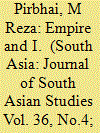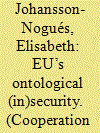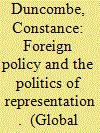| Srl | Item |
| 1 |
ID:
126174


|
|
|
|
|
| Publication |
2013.
|
| Summary/Abstract |
Framed in a discussion of post-colonial approaches to the British Empire's influence on culture, a close reading of Captain Donald Campbell's late eighteenth-century travelogue contextualises the personal particularities in his assessments of Habsburg Europe, Ottoman West Asia and Mysorean/British South Asia. His is an imagination in which the bonds of 'religion' ameliorate the 'otherness' of continental Europeans, while his concept of 'enlightenment' learning is deployed to understand the Ottomans. Only in the case of South Asia is the very humanity of the 'other' denied. I argue that this landscape of otherness reflects the coincidence of the interests of his 'self' and the 'Empire', which overlap most thoroughly in South Asia. Campbell's travelogue is of value to post-colonial approaches, as it is a particularly poignant example of the manner in which the particularities of the 'self' contribute to the construction of broader cultural discourses permeated by 'Empire'.
|
|
|
|
|
|
|
|
|
|
|
|
|
|
|
|
| 2 |
ID:
162437


|
|
|
|
|
| Summary/Abstract |
The 2016 EU Global Strategy and the 2015 European Neighbourhood Policy (ENP) review have made stabilisation of the ENP area one of their main priorities. Our argument here, however, is that the Global Strategy and the ENP review not only seek to mitigate the numerous crises currently affecting the neighbourhood; they also aim to address a set of intra-EU vulnerabilities linked to events in the ENP area that are threatening the EU’s own ontological security. We employ narrative analysis to explore how insecurity in the EU and in the ENP area is affecting the EU’s relation to the neighbourhood-other and its understanding of the EU-self. Our main findings point to the Global Strategy and the ENP review providing ample measures to stabilise the neighbourhood. However, whether they have provided a sufficiently compelling narrative to enable the emergence of new emotional structures for the EU and its member states to make sense of themselves and their relation to the neighbourhood-other remains an open question.
|
|
|
|
|
|
|
|
|
|
|
|
|
|
|
|
| 3 |
ID:
101829


|
|
|
|
|
| Publication |
2011.
|
| Summary/Abstract |
The patterns of representation that position the West as the dominant enlightened Self to the non-West's subordinate Other are evident in Hollywood filmmaking. Films such as A Mighty Heart, The Kingdom and The Siege continue to maintain the Hegelian Master/Slave dialectic of West/non-West, which becomes part of the narrative of the West's identity construction. In delving into this supposed relationship between West and non-West, it appears as though few scholars have considered how the processes of representation feed into this essentialised dialectic. In delving into the area of representation, a space for understanding emerges in relation to determining whether or how much being represented in certain ways affects or acts to manipulate the behaviour and choices of the Other, especially in terms of foreign policy conduct. This article examines representational dynamics in terms of the position of the Other as Self, in order to offer an authoritative conception of how schemas of representation influence the direction of foreign policy.
|
|
|
|
|
|
|
|
|
|
|
|
|
|
|
|